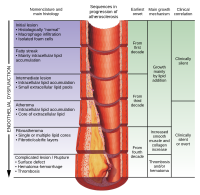
Photo from wikipedia
Objective To investigate relationships of education and intracranial volume (ICV) (factors related to cognitive and brain reserve, respectively) with cognitive trajectories and mortality in individuals with biomarker-defined Alzheimer disease (AD).… Click to show full abstract
Objective To investigate relationships of education and intracranial volume (ICV) (factors related to cognitive and brain reserve, respectively) with cognitive trajectories and mortality in individuals with biomarker-defined Alzheimer disease (AD). Methods We selected 1,298 β-amyloid–positive memory clinic patients with subjective cognitive decline (SCD, n = 142), mild cognitive impairment (MCI, n = 274), or AD dementia (n = 882) from the Amsterdam Dementia Cohort. All participants underwent baseline MRI and neuropsychological assessment, and 68% received cognitive follow-up (median 2.3 years, interquartile range 2.4). Mortality data were collected from the Central Public Administration. In the total sample and stratified by disease stage (i.e., SCD/MCI vs dementia), we examined education and ICV as predictors of baseline and longitudinal cognitive performance on 5 cognitive domains (memory, attention, executive, language, and visuospatial functions; linear mixed models) and time to death (Cox proportional hazard models). Analyses were adjusted for age, sex, whole brain gray matter atrophy, and MRI field strength. Results Education and ICV showed consistent positive associations with baseline cognition across disease stages. Longitudinally, we observed a relationship between higher education and faster cognitive decline among patients with dementia on global cognition, memory, executive function, and language (range β = −0.06 to −0.13; all p < 0.05). Furthermore, in the total sample, both higher education and larger ICV were related to lower mortality risk (hazard ratio 0.84 and 0.82, respectively; p < 0.05). Discussion In this β-amyloid–positive memory clinic sample, both cognitive and brain reserve were positively associated with baseline cognition, whereas only education was related to longitudinal cognition (i.e., accelerated decline among more highly educated patients with dementia). Higher education and ICV both moderately attenuated overall mortality risk in AD.
Journal Title: Neurology
Year Published: 2022
Link to full text (if available)
Share on Social Media: Sign Up to like & get
recommendations!